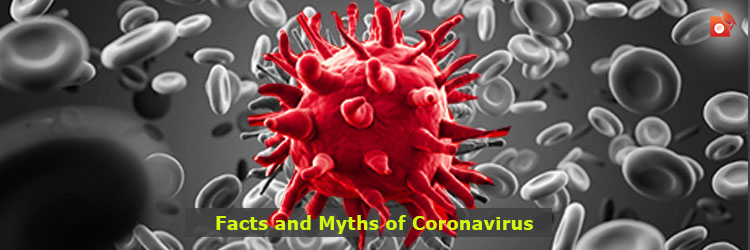Covid-19 | Facts and Myths of Coronavirus
2020-03-26 | Team PendulumEdu

On 31 December 2019, the World Health Organisation was informed about the cases of pneumonia due to novel coronavirus in Wuhan, China.
Since then, the number of affected people and deaths all over the world has crossed such figures that it was declared a pandemic by WHO. Lockdowns, curfews, quarantines, social distancing, etc. are being observed across the globe, including India.
What are Coronaviruses?
These are a family of viruses that cause the common cold and other severe diseases like Severe Acute Respiratory Syndrome (SARS) and Middle East Respiratory Syndrome (MERS). Most of these are zoonotic (spreads from animals to humans).
SARS virus transmitted from bats and MERS virus transmitted from dromedary camel to humans.
There is evidence that SARS CoV 2 has transmitted from bats.
How SARS-CoV 2 is different from other coronaviruses?
The novel coronavirus SARS CoV 2, like other coronaviruses, is spherical and has mushroom-shaped proteins called spikes. The spike protein binds to the cellular receptors and enters the human cells.
But unlike SARS, the spike protein of SARS CoV 2 binds to the cell receptor with ten to twenty times high affinity.
COVID-19: Symptoms and Transmission
Symptoms such as fever, runny nose, breathing problems, dry cough, etc. appear within two to 14 days of exposure.
The disease spreads through direct contact with the infected person or by touching the contaminated surface or object. When an infected person sneezes or coughs, the droplets enter into the mouth or nose of the person in contact with the infected person.
The disease affects people of all ages, but the fatality rate is high for the people above 80 years of age or those with low immunity or suffering from diseases like diabetes, cardiovascular diseases, etc.
Test and Treatment
The virus can be detected through the Polymerase Chain Reaction (PCR) Test in which copies of DNA are created to check for the presence of a specific strain of the virus in the human body.
Currently, there is no vaccine or anti-virals that is recommended for the treatment of COVID-19. Research is still going on worldwide to develop the vaccine. The first human trial for the COVID-19 vaccine was approved by the US.
How to protect yourself and others?
- Regularly wash your hands with soap or alcohol-based sanitizers, which are useful in containing the spread of the virus.
- Wearing masks to prevent transmission.
- Maintaining social distance- stand at least one meter away from the people around you.
- Avoid touching your eyes, nose, and mouth with your hands.
- Cover your mouth with a tissue or bent elbow while sneezing or coughing.
- Those infected immediately seek medical services and remain in isolation.
- Be at home; avoid traveling to break the chain of community spread of the virus.
FAQs and Facts & Myths related to COVID-19
Q. Which is more effective - soap or alcohol - based sanitizer against the new virus?
Ans. Both the soap and alcohol-based sanitizers are effective in preventing the spread of the virus. The sanitizers with more than 60% of alcohol are more effective.
Q. How will one know that he or she is suffering from COVID-19 or flu?
Ans. A person suffering from flu will develop symptoms like cold, cough, and fever, but, if the person also faces breathing problems, then it is a symptom of Coronavirus infection.
Q. How capable are thermal scanners in detecting coronavirus infected people?
Ans. Thermal Scanners can detect high body temperature, which is a symptom of coronavirus infection. But, there is a limitation as some of the infected people develop a fever between 2 to 10 days, and such people cannot be detected.
Q. Can an infected person transmit the virus to others if he/she uses a shared swimming pool?
Ans. Coronavirus infection spreads through respiratory droplets, which, when inhaled by the other person, infects him/her. If the chlorination of swimming pools is up to the recommended levels, then it is highly unlikely that the virus will be activated.
Q. Can the new virus be transmitted in areas with hot and humid climate?
Ans. The SARS CoV 2 can spread in all areas, including areas with hot and humid weather. One needs to wash hands frequently and take precautionary measures to protect oneself and others.
Q. Can cold weather and snow kill the new virus?
Ans. The coronavirus cannot be killed by cold weather and snow, as in every circumstance, the human body temperature will remain around 37 degrees Celsius.
Q. Can a hot bath prevent the new coronavirus disease?
Ans. Taking a hot bath does not prevent you from being infected with COVID-19. The best way to protect yourself is by regularly washing hands with soap and avoid touching your eyes, nose, and mouth.
Q. Can the virus spread through Mosquito bites?
Ans. No evidence at present suggests the transmission of this virus through mosquito bites. The SARS CoV 2 is a respiratory virus that gets transmitted through droplets of an infected person.
Q. Are hand dryers and ultraviolet disinfection lamps effective in killing the new coronavirus?
Ans. Hand dryers are not effective in killing the COVID-19 virus. While UV lamps should not be used to sterilize the skin as UV rays can cause skin irritation.
Q. Can spraying alcohol or chlorine all over the body kill novel coronavirus?
Ans. No, spraying alcohol or chlorine all over the body does not kill the viruses that have already entered the human body. Such substances are useful to disinfect surfaces and should be used under appropriate recommendations.
Q. Do vaccines against pneumonia effective in the treatment of COVID-19?
Ans. Vaccines such as pneumococcal vaccine and Haemophilus influenza type B vaccine are not effective against the new virus. But, the vaccination against respiratory illness is highly recommended. There is no vaccine at present, and the researchers are trying to develop one against the nCoV.
Q. Are there any prescribed antibiotics or other medicines for preventing and treating the new coronavirus?
Ans. Antibiotics do not work against viruses, and hence, these can only prevent the infected person from protecting against the possible bacterial co-infection. At present, there is no particular medicine to prevent or treat 2019-nCoV.
Q. Can eating garlic help prevent infection with the new coronavirus?
Ans. Garlic has some antimicrobial properties, but there is no evidence to support that eating garlic can help prevent infection with the new coronavirus.
Q. Should people avoid eating meat-based food to prevent spread?
Ans. Since 2019 n-CoV is a respiratory virus and not a foodborne. One can eat whatever they want.
Share Blog






Comments